Research Approaches: Action Research and Appreciative Inquiry Report
VerifiedAdded on 2022/12/26
|9
|2406
|55
Report
AI Summary
This report provides a comprehensive overview of research approaches, with a particular emphasis on action research and appreciative inquiry. It begins by outlining the major research approaches, including inductive, deductive, and abductive methods, highlighting their key characteristics and differences. The report then delves into the action research approach, explaining its collaborative nature and its division into positivism, interpretive, and critical approaches. It discusses the advantages of action research, such as its practical relevance and applicability to both quantitative and qualitative data, while also acknowledging its challenges, including time consumption and replicability issues. The report further explores the appreciative inquiry approach, detailing its positive focus on organizational development and its benefits, such as fostering creativity and promoting a sense of identity. The report uses a case study to illustrate the application of appreciative inquiry and concludes by comparing the two approaches, arguing for the effectiveness of appreciative inquiry due to its ability to inspire enthusiasm and promote best practices in research.

Name:
Institution Affiliation:
Title: Research approach
Date
Institution Affiliation:
Title: Research approach
Date
Paraphrase This Document
Need a fresh take? Get an instant paraphrase of this document with our AI Paraphraser
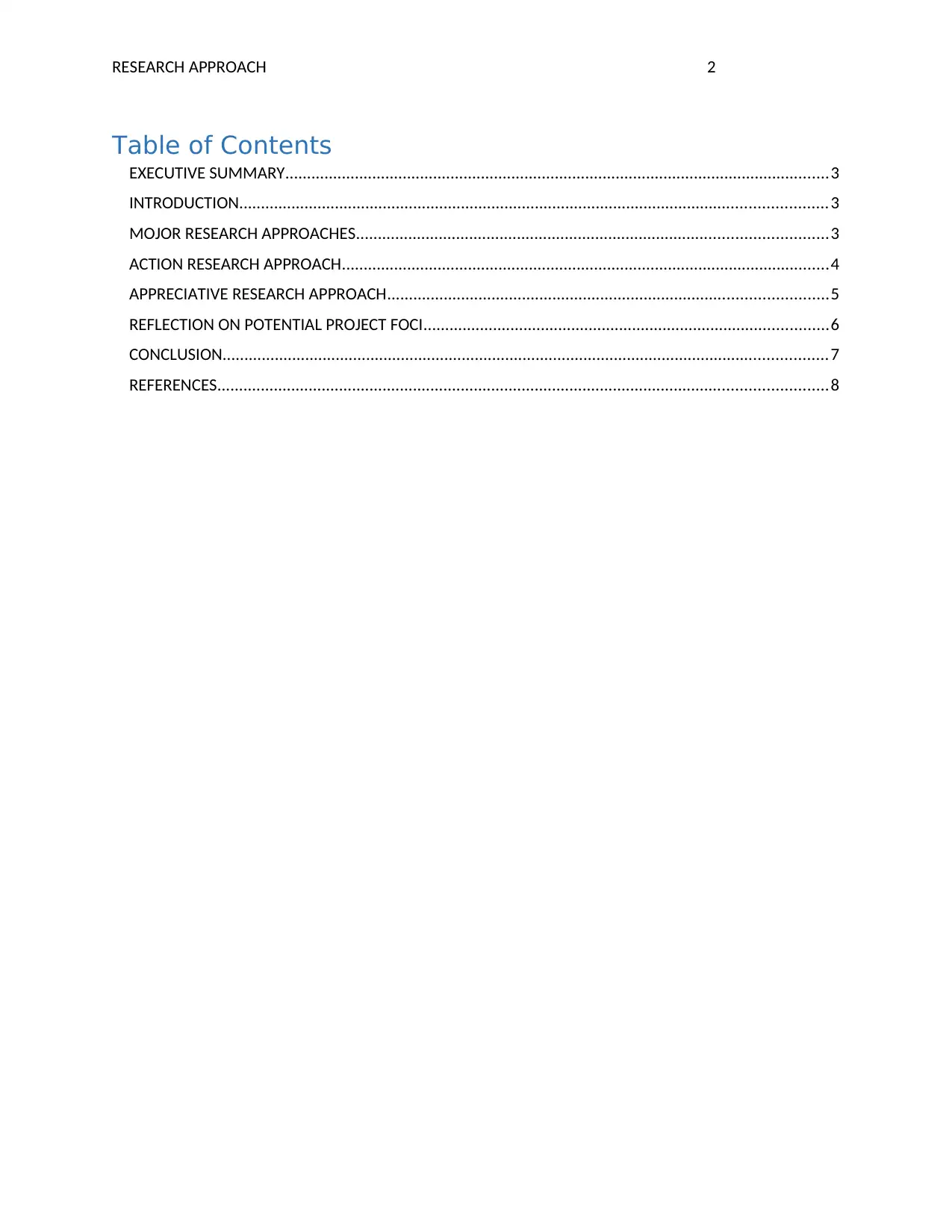
RESEARCH APPROACH 2
Table of Contents
EXECUTIVE SUMMARY.............................................................................................................................3
INTRODUCTION.......................................................................................................................................3
MOJOR RESEARCH APPROACHES............................................................................................................3
ACTION RESEARCH APPROACH................................................................................................................4
APPRECIATIVE RESEARCH APPROACH.....................................................................................................5
REFLECTION ON POTENTIAL PROJECT FOCI.............................................................................................6
CONCLUSION...........................................................................................................................................7
REFERENCES............................................................................................................................................8
Table of Contents
EXECUTIVE SUMMARY.............................................................................................................................3
INTRODUCTION.......................................................................................................................................3
MOJOR RESEARCH APPROACHES............................................................................................................3
ACTION RESEARCH APPROACH................................................................................................................4
APPRECIATIVE RESEARCH APPROACH.....................................................................................................5
REFLECTION ON POTENTIAL PROJECT FOCI.............................................................................................6
CONCLUSION...........................................................................................................................................7
REFERENCES............................................................................................................................................8
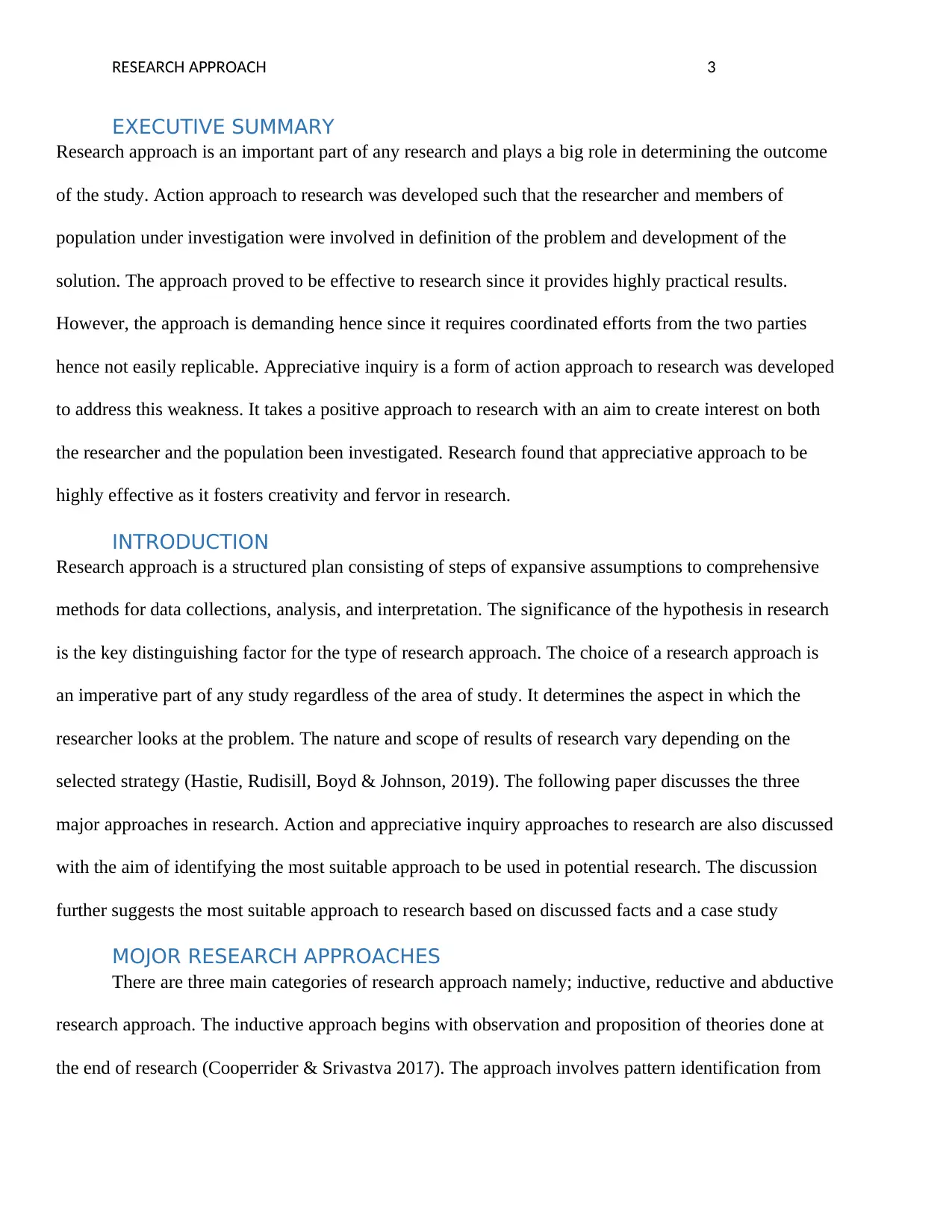
RESEARCH APPROACH 3
EXECUTIVE SUMMARY
Research approach is an important part of any research and plays a big role in determining the outcome
of the study. Action approach to research was developed such that the researcher and members of
population under investigation were involved in definition of the problem and development of the
solution. The approach proved to be effective to research since it provides highly practical results.
However, the approach is demanding hence since it requires coordinated efforts from the two parties
hence not easily replicable. Appreciative inquiry is a form of action approach to research was developed
to address this weakness. It takes a positive approach to research with an aim to create interest on both
the researcher and the population been investigated. Research found that appreciative approach to be
highly effective as it fosters creativity and fervor in research.
INTRODUCTION
Research approach is a structured plan consisting of steps of expansive assumptions to comprehensive
methods for data collections, analysis, and interpretation. The significance of the hypothesis in research
is the key distinguishing factor for the type of research approach. The choice of a research approach is
an imperative part of any study regardless of the area of study. It determines the aspect in which the
researcher looks at the problem. The nature and scope of results of research vary depending on the
selected strategy (Hastie, Rudisill, Boyd & Johnson, 2019). The following paper discusses the three
major approaches in research. Action and appreciative inquiry approaches to research are also discussed
with the aim of identifying the most suitable approach to be used in potential research. The discussion
further suggests the most suitable approach to research based on discussed facts and a case study
MOJOR RESEARCH APPROACHES
There are three main categories of research approach namely; inductive, reductive and abductive
research approach. The inductive approach begins with observation and proposition of theories done at
the end of research (Cooperrider & Srivastva 2017). The approach involves pattern identification from
EXECUTIVE SUMMARY
Research approach is an important part of any research and plays a big role in determining the outcome
of the study. Action approach to research was developed such that the researcher and members of
population under investigation were involved in definition of the problem and development of the
solution. The approach proved to be effective to research since it provides highly practical results.
However, the approach is demanding hence since it requires coordinated efforts from the two parties
hence not easily replicable. Appreciative inquiry is a form of action approach to research was developed
to address this weakness. It takes a positive approach to research with an aim to create interest on both
the researcher and the population been investigated. Research found that appreciative approach to be
highly effective as it fosters creativity and fervor in research.
INTRODUCTION
Research approach is a structured plan consisting of steps of expansive assumptions to comprehensive
methods for data collections, analysis, and interpretation. The significance of the hypothesis in research
is the key distinguishing factor for the type of research approach. The choice of a research approach is
an imperative part of any study regardless of the area of study. It determines the aspect in which the
researcher looks at the problem. The nature and scope of results of research vary depending on the
selected strategy (Hastie, Rudisill, Boyd & Johnson, 2019). The following paper discusses the three
major approaches in research. Action and appreciative inquiry approaches to research are also discussed
with the aim of identifying the most suitable approach to be used in potential research. The discussion
further suggests the most suitable approach to research based on discussed facts and a case study
MOJOR RESEARCH APPROACHES
There are three main categories of research approach namely; inductive, reductive and abductive
research approach. The inductive approach begins with observation and proposition of theories done at
the end of research (Cooperrider & Srivastva 2017). The approach involves pattern identification from
⊘ This is a preview!⊘
Do you want full access?
Subscribe today to unlock all pages.

Trusted by 1+ million students worldwide
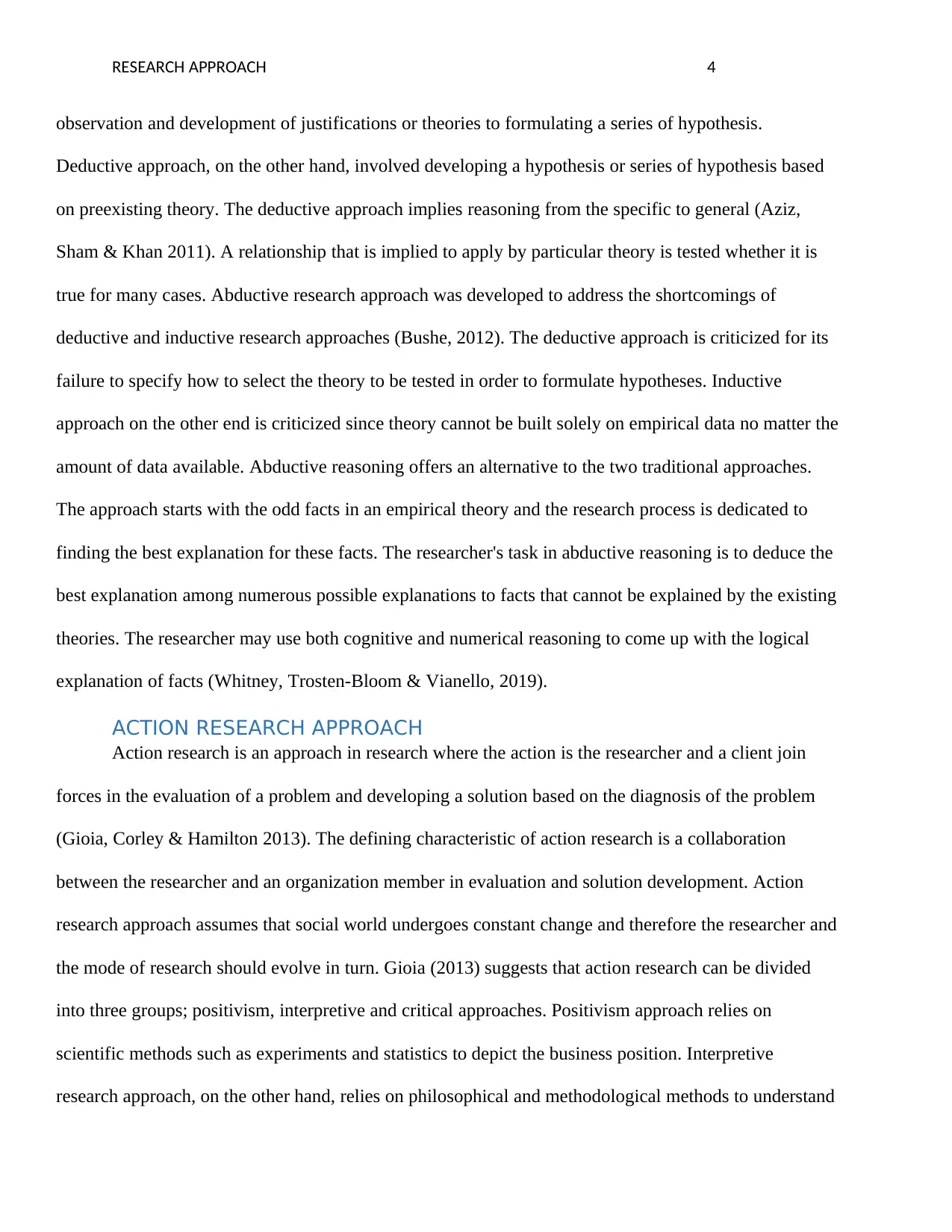
RESEARCH APPROACH 4
observation and development of justifications or theories to formulating a series of hypothesis.
Deductive approach, on the other hand, involved developing a hypothesis or series of hypothesis based
on preexisting theory. The deductive approach implies reasoning from the specific to general (Aziz,
Sham & Khan 2011). A relationship that is implied to apply by particular theory is tested whether it is
true for many cases. Abductive research approach was developed to address the shortcomings of
deductive and inductive research approaches (Bushe, 2012). The deductive approach is criticized for its
failure to specify how to select the theory to be tested in order to formulate hypotheses. Inductive
approach on the other end is criticized since theory cannot be built solely on empirical data no matter the
amount of data available. Abductive reasoning offers an alternative to the two traditional approaches.
The approach starts with the odd facts in an empirical theory and the research process is dedicated to
finding the best explanation for these facts. The researcher's task in abductive reasoning is to deduce the
best explanation among numerous possible explanations to facts that cannot be explained by the existing
theories. The researcher may use both cognitive and numerical reasoning to come up with the logical
explanation of facts (Whitney, Trosten-Bloom & Vianello, 2019).
ACTION RESEARCH APPROACH
Action research is an approach in research where the action is the researcher and a client join
forces in the evaluation of a problem and developing a solution based on the diagnosis of the problem
(Gioia, Corley & Hamilton 2013). The defining characteristic of action research is a collaboration
between the researcher and an organization member in evaluation and solution development. Action
research approach assumes that social world undergoes constant change and therefore the researcher and
the mode of research should evolve in turn. Gioia (2013) suggests that action research can be divided
into three groups; positivism, interpretive and critical approaches. Positivism approach relies on
scientific methods such as experiments and statistics to depict the business position. Interpretive
research approach, on the other hand, relies on philosophical and methodological methods to understand
observation and development of justifications or theories to formulating a series of hypothesis.
Deductive approach, on the other hand, involved developing a hypothesis or series of hypothesis based
on preexisting theory. The deductive approach implies reasoning from the specific to general (Aziz,
Sham & Khan 2011). A relationship that is implied to apply by particular theory is tested whether it is
true for many cases. Abductive research approach was developed to address the shortcomings of
deductive and inductive research approaches (Bushe, 2012). The deductive approach is criticized for its
failure to specify how to select the theory to be tested in order to formulate hypotheses. Inductive
approach on the other end is criticized since theory cannot be built solely on empirical data no matter the
amount of data available. Abductive reasoning offers an alternative to the two traditional approaches.
The approach starts with the odd facts in an empirical theory and the research process is dedicated to
finding the best explanation for these facts. The researcher's task in abductive reasoning is to deduce the
best explanation among numerous possible explanations to facts that cannot be explained by the existing
theories. The researcher may use both cognitive and numerical reasoning to come up with the logical
explanation of facts (Whitney, Trosten-Bloom & Vianello, 2019).
ACTION RESEARCH APPROACH
Action research is an approach in research where the action is the researcher and a client join
forces in the evaluation of a problem and developing a solution based on the diagnosis of the problem
(Gioia, Corley & Hamilton 2013). The defining characteristic of action research is a collaboration
between the researcher and an organization member in evaluation and solution development. Action
research approach assumes that social world undergoes constant change and therefore the researcher and
the mode of research should evolve in turn. Gioia (2013) suggests that action research can be divided
into three groups; positivism, interpretive and critical approaches. Positivism approach relies on
scientific methods such as experiments and statistics to depict the business position. Interpretive
research approach, on the other hand, relies on philosophical and methodological methods to understand
Paraphrase This Document
Need a fresh take? Get an instant paraphrase of this document with our AI Paraphraser
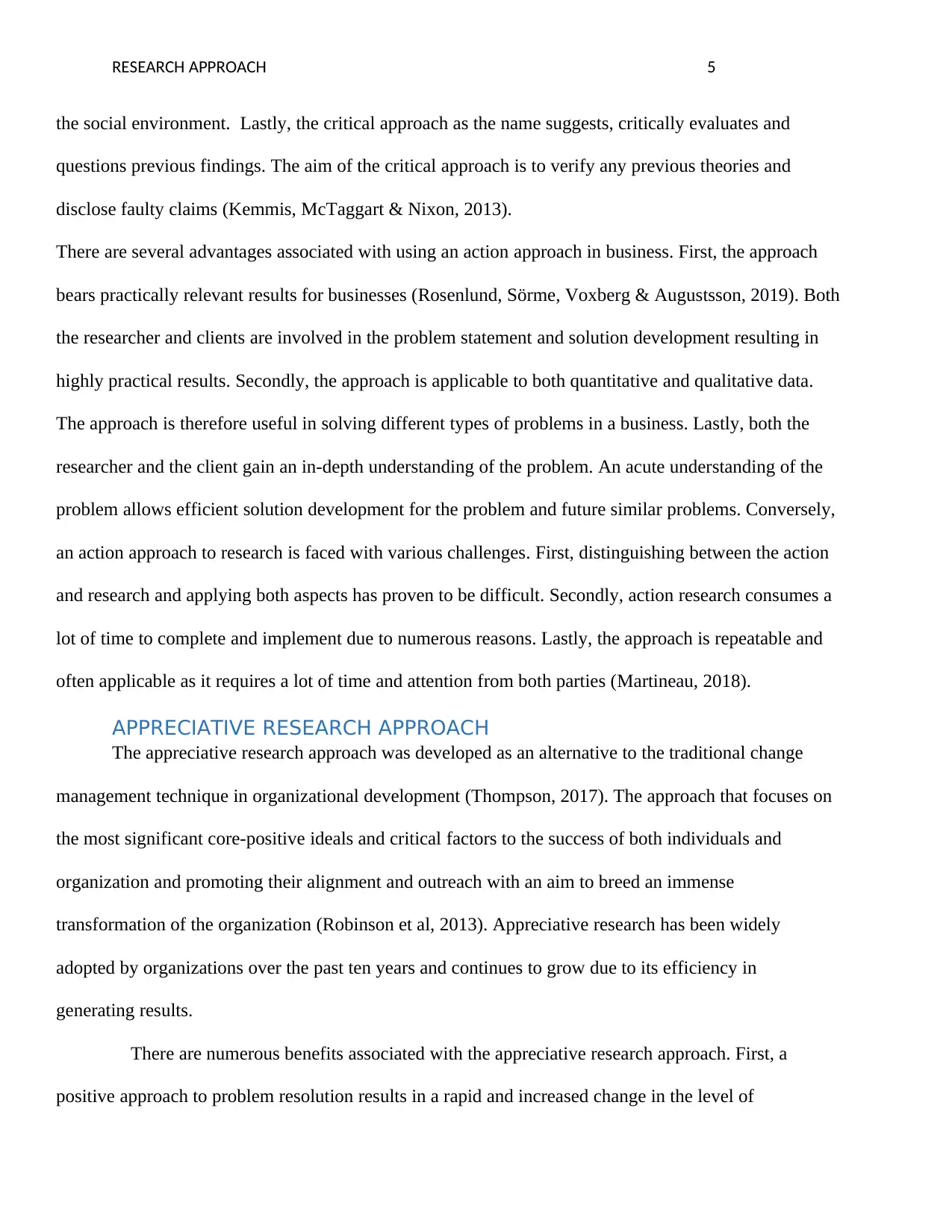
RESEARCH APPROACH 5
the social environment. Lastly, the critical approach as the name suggests, critically evaluates and
questions previous findings. The aim of the critical approach is to verify any previous theories and
disclose faulty claims (Kemmis, McTaggart & Nixon, 2013).
There are several advantages associated with using an action approach in business. First, the approach
bears practically relevant results for businesses (Rosenlund, Sörme, Voxberg & Augustsson, 2019). Both
the researcher and clients are involved in the problem statement and solution development resulting in
highly practical results. Secondly, the approach is applicable to both quantitative and qualitative data.
The approach is therefore useful in solving different types of problems in a business. Lastly, both the
researcher and the client gain an in-depth understanding of the problem. An acute understanding of the
problem allows efficient solution development for the problem and future similar problems. Conversely,
an action approach to research is faced with various challenges. First, distinguishing between the action
and research and applying both aspects has proven to be difficult. Secondly, action research consumes a
lot of time to complete and implement due to numerous reasons. Lastly, the approach is repeatable and
often applicable as it requires a lot of time and attention from both parties (Martineau, 2018).
APPRECIATIVE RESEARCH APPROACH
The appreciative research approach was developed as an alternative to the traditional change
management technique in organizational development (Thompson, 2017). The approach that focuses on
the most significant core-positive ideals and critical factors to the success of both individuals and
organization and promoting their alignment and outreach with an aim to breed an immense
transformation of the organization (Robinson et al, 2013). Appreciative research has been widely
adopted by organizations over the past ten years and continues to grow due to its efficiency in
generating results.
There are numerous benefits associated with the appreciative research approach. First, a
positive approach to problem resolution results in a rapid and increased change in the level of
the social environment. Lastly, the critical approach as the name suggests, critically evaluates and
questions previous findings. The aim of the critical approach is to verify any previous theories and
disclose faulty claims (Kemmis, McTaggart & Nixon, 2013).
There are several advantages associated with using an action approach in business. First, the approach
bears practically relevant results for businesses (Rosenlund, Sörme, Voxberg & Augustsson, 2019). Both
the researcher and clients are involved in the problem statement and solution development resulting in
highly practical results. Secondly, the approach is applicable to both quantitative and qualitative data.
The approach is therefore useful in solving different types of problems in a business. Lastly, both the
researcher and the client gain an in-depth understanding of the problem. An acute understanding of the
problem allows efficient solution development for the problem and future similar problems. Conversely,
an action approach to research is faced with various challenges. First, distinguishing between the action
and research and applying both aspects has proven to be difficult. Secondly, action research consumes a
lot of time to complete and implement due to numerous reasons. Lastly, the approach is repeatable and
often applicable as it requires a lot of time and attention from both parties (Martineau, 2018).
APPRECIATIVE RESEARCH APPROACH
The appreciative research approach was developed as an alternative to the traditional change
management technique in organizational development (Thompson, 2017). The approach that focuses on
the most significant core-positive ideals and critical factors to the success of both individuals and
organization and promoting their alignment and outreach with an aim to breed an immense
transformation of the organization (Robinson et al, 2013). Appreciative research has been widely
adopted by organizations over the past ten years and continues to grow due to its efficiency in
generating results.
There are numerous benefits associated with the appreciative research approach. First, a
positive approach to problem resolution results in a rapid and increased change in the level of
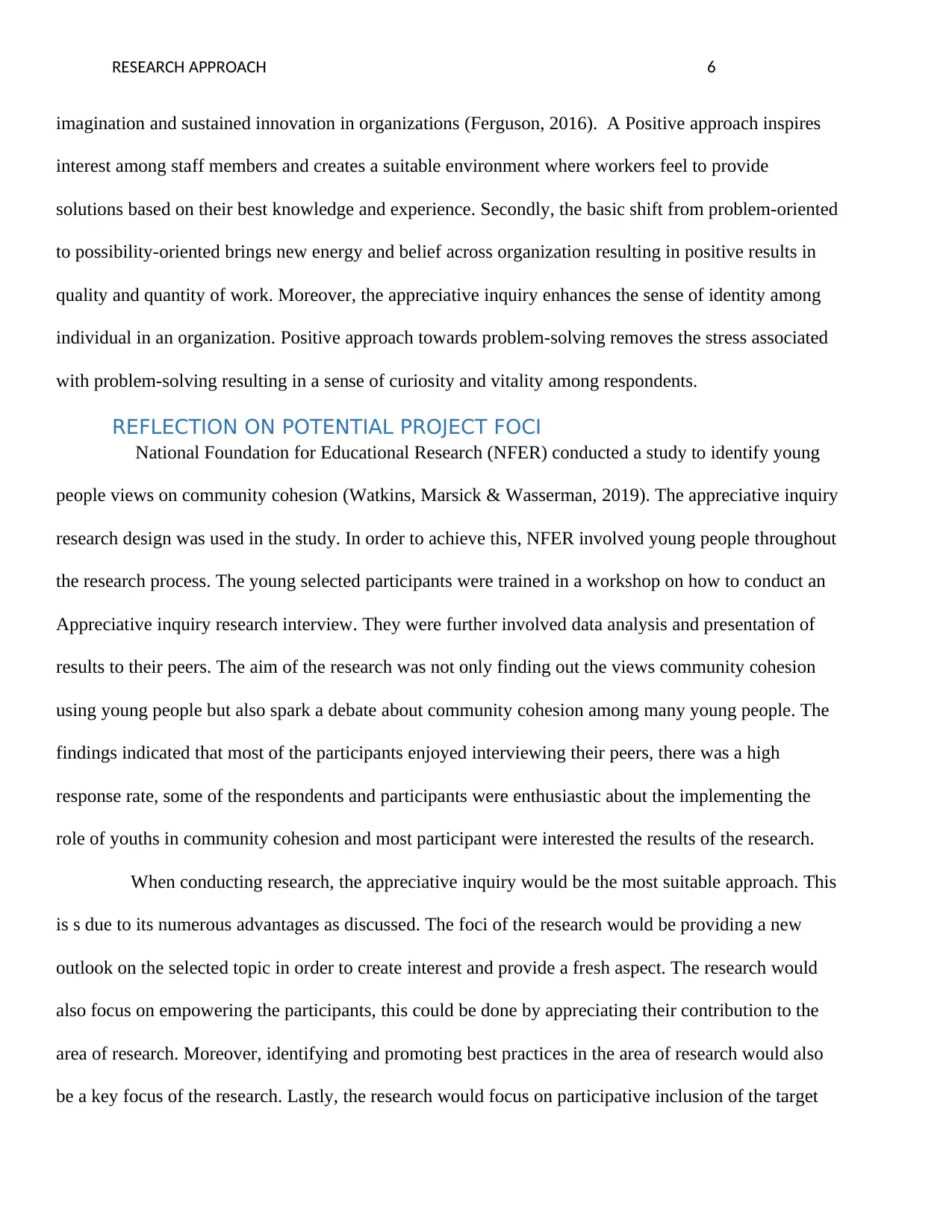
RESEARCH APPROACH 6
imagination and sustained innovation in organizations (Ferguson, 2016). A Positive approach inspires
interest among staff members and creates a suitable environment where workers feel to provide
solutions based on their best knowledge and experience. Secondly, the basic shift from problem-oriented
to possibility-oriented brings new energy and belief across organization resulting in positive results in
quality and quantity of work. Moreover, the appreciative inquiry enhances the sense of identity among
individual in an organization. Positive approach towards problem-solving removes the stress associated
with problem-solving resulting in a sense of curiosity and vitality among respondents.
REFLECTION ON POTENTIAL PROJECT FOCI
National Foundation for Educational Research (NFER) conducted a study to identify young
people views on community cohesion (Watkins, Marsick & Wasserman, 2019). The appreciative inquiry
research design was used in the study. In order to achieve this, NFER involved young people throughout
the research process. The young selected participants were trained in a workshop on how to conduct an
Appreciative inquiry research interview. They were further involved data analysis and presentation of
results to their peers. The aim of the research was not only finding out the views community cohesion
using young people but also spark a debate about community cohesion among many young people. The
findings indicated that most of the participants enjoyed interviewing their peers, there was a high
response rate, some of the respondents and participants were enthusiastic about the implementing the
role of youths in community cohesion and most participant were interested the results of the research.
When conducting research, the appreciative inquiry would be the most suitable approach. This
is s due to its numerous advantages as discussed. The foci of the research would be providing a new
outlook on the selected topic in order to create interest and provide a fresh aspect. The research would
also focus on empowering the participants, this could be done by appreciating their contribution to the
area of research. Moreover, identifying and promoting best practices in the area of research would also
be a key focus of the research. Lastly, the research would focus on participative inclusion of the target
imagination and sustained innovation in organizations (Ferguson, 2016). A Positive approach inspires
interest among staff members and creates a suitable environment where workers feel to provide
solutions based on their best knowledge and experience. Secondly, the basic shift from problem-oriented
to possibility-oriented brings new energy and belief across organization resulting in positive results in
quality and quantity of work. Moreover, the appreciative inquiry enhances the sense of identity among
individual in an organization. Positive approach towards problem-solving removes the stress associated
with problem-solving resulting in a sense of curiosity and vitality among respondents.
REFLECTION ON POTENTIAL PROJECT FOCI
National Foundation for Educational Research (NFER) conducted a study to identify young
people views on community cohesion (Watkins, Marsick & Wasserman, 2019). The appreciative inquiry
research design was used in the study. In order to achieve this, NFER involved young people throughout
the research process. The young selected participants were trained in a workshop on how to conduct an
Appreciative inquiry research interview. They were further involved data analysis and presentation of
results to their peers. The aim of the research was not only finding out the views community cohesion
using young people but also spark a debate about community cohesion among many young people. The
findings indicated that most of the participants enjoyed interviewing their peers, there was a high
response rate, some of the respondents and participants were enthusiastic about the implementing the
role of youths in community cohesion and most participant were interested the results of the research.
When conducting research, the appreciative inquiry would be the most suitable approach. This
is s due to its numerous advantages as discussed. The foci of the research would be providing a new
outlook on the selected topic in order to create interest and provide a fresh aspect. The research would
also focus on empowering the participants, this could be done by appreciating their contribution to the
area of research. Moreover, identifying and promoting best practices in the area of research would also
be a key focus of the research. Lastly, the research would focus on participative inclusion of the target
⊘ This is a preview!⊘
Do you want full access?
Subscribe today to unlock all pages.

Trusted by 1+ million students worldwide
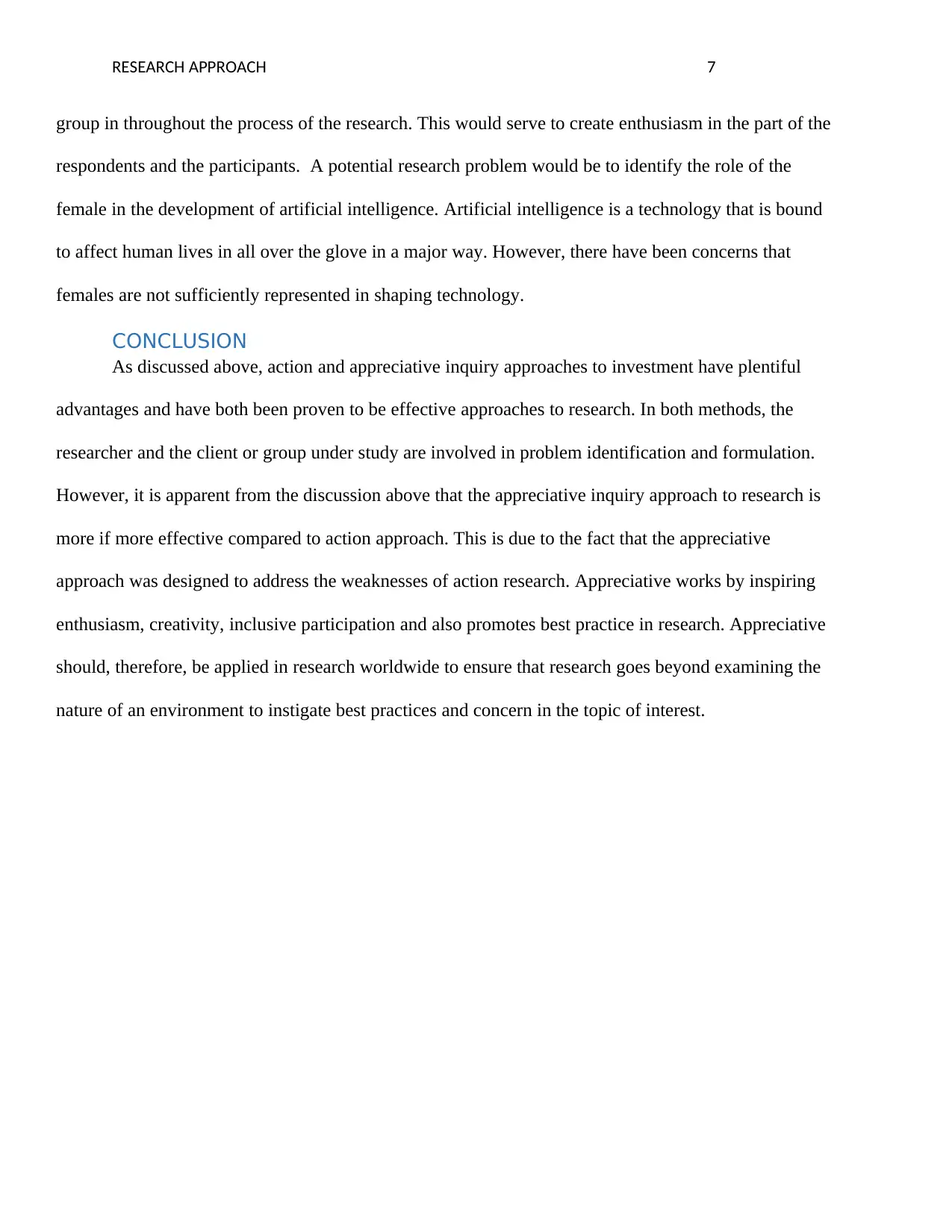
RESEARCH APPROACH 7
group in throughout the process of the research. This would serve to create enthusiasm in the part of the
respondents and the participants. A potential research problem would be to identify the role of the
female in the development of artificial intelligence. Artificial intelligence is a technology that is bound
to affect human lives in all over the glove in a major way. However, there have been concerns that
females are not sufficiently represented in shaping technology.
CONCLUSION
As discussed above, action and appreciative inquiry approaches to investment have plentiful
advantages and have both been proven to be effective approaches to research. In both methods, the
researcher and the client or group under study are involved in problem identification and formulation.
However, it is apparent from the discussion above that the appreciative inquiry approach to research is
more if more effective compared to action approach. This is due to the fact that the appreciative
approach was designed to address the weaknesses of action research. Appreciative works by inspiring
enthusiasm, creativity, inclusive participation and also promotes best practice in research. Appreciative
should, therefore, be applied in research worldwide to ensure that research goes beyond examining the
nature of an environment to instigate best practices and concern in the topic of interest.
group in throughout the process of the research. This would serve to create enthusiasm in the part of the
respondents and the participants. A potential research problem would be to identify the role of the
female in the development of artificial intelligence. Artificial intelligence is a technology that is bound
to affect human lives in all over the glove in a major way. However, there have been concerns that
females are not sufficiently represented in shaping technology.
CONCLUSION
As discussed above, action and appreciative inquiry approaches to investment have plentiful
advantages and have both been proven to be effective approaches to research. In both methods, the
researcher and the client or group under study are involved in problem identification and formulation.
However, it is apparent from the discussion above that the appreciative inquiry approach to research is
more if more effective compared to action approach. This is due to the fact that the appreciative
approach was designed to address the weaknesses of action research. Appreciative works by inspiring
enthusiasm, creativity, inclusive participation and also promotes best practice in research. Appreciative
should, therefore, be applied in research worldwide to ensure that research goes beyond examining the
nature of an environment to instigate best practices and concern in the topic of interest.
Paraphrase This Document
Need a fresh take? Get an instant paraphrase of this document with our AI Paraphraser
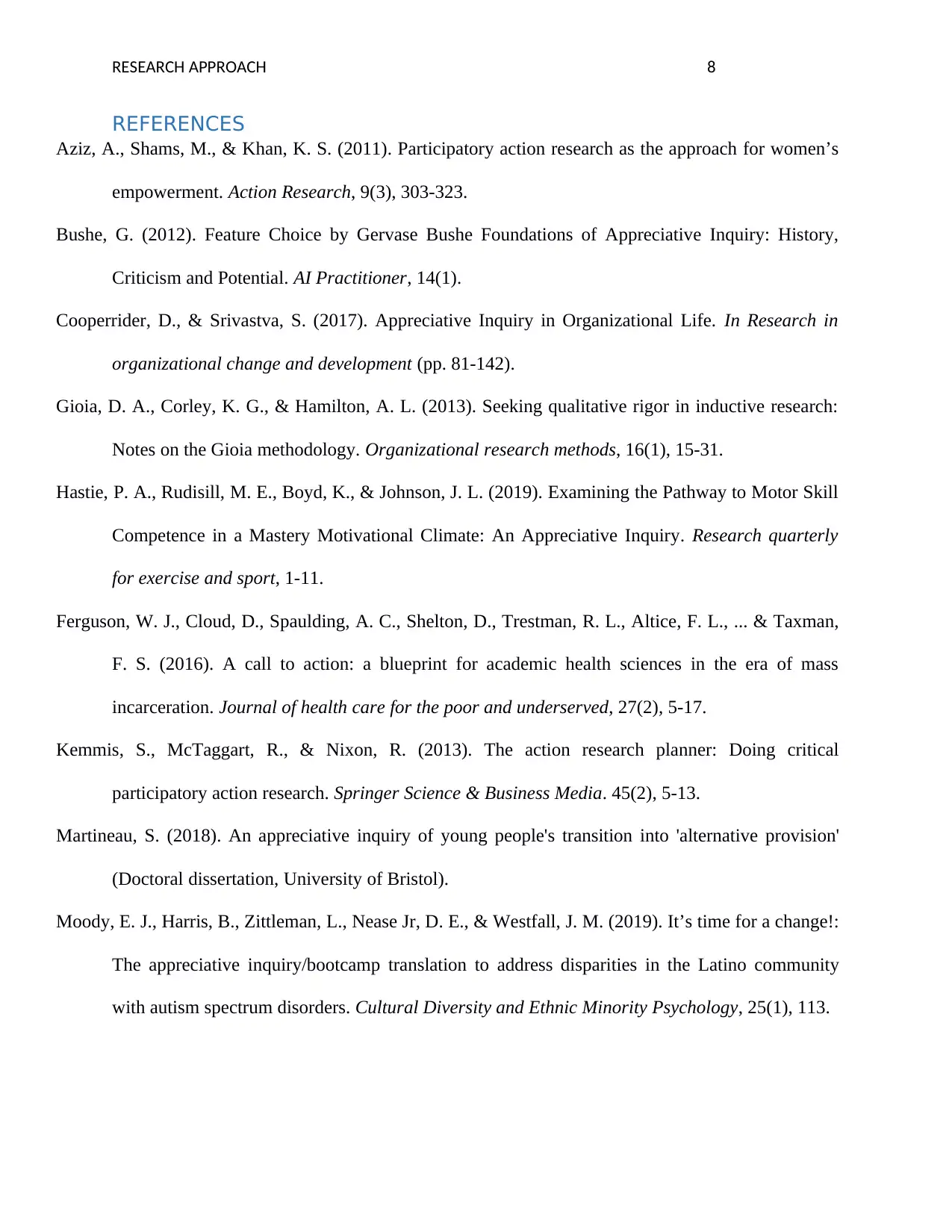
RESEARCH APPROACH 8
REFERENCES
Aziz, A., Shams, M., & Khan, K. S. (2011). Participatory action research as the approach for women’s
empowerment. Action Research, 9(3), 303-323.
Bushe, G. (2012). Feature Choice by Gervase Bushe Foundations of Appreciative Inquiry: History,
Criticism and Potential. AI Practitioner, 14(1).
Cooperrider, D., & Srivastva, S. (2017). Appreciative Inquiry in Organizational Life. In Research in
organizational change and development (pp. 81-142).
Gioia, D. A., Corley, K. G., & Hamilton, A. L. (2013). Seeking qualitative rigor in inductive research:
Notes on the Gioia methodology. Organizational research methods, 16(1), 15-31.
Hastie, P. A., Rudisill, M. E., Boyd, K., & Johnson, J. L. (2019). Examining the Pathway to Motor Skill
Competence in a Mastery Motivational Climate: An Appreciative Inquiry. Research quarterly
for exercise and sport, 1-11.
Ferguson, W. J., Cloud, D., Spaulding, A. C., Shelton, D., Trestman, R. L., Altice, F. L., ... & Taxman,
F. S. (2016). A call to action: a blueprint for academic health sciences in the era of mass
incarceration. Journal of health care for the poor and underserved, 27(2), 5-17.
Kemmis, S., McTaggart, R., & Nixon, R. (2013). The action research planner: Doing critical
participatory action research. Springer Science & Business Media. 45(2), 5-13.
Martineau, S. (2018). An appreciative inquiry of young people's transition into 'alternative provision'
(Doctoral dissertation, University of Bristol).
Moody, E. J., Harris, B., Zittleman, L., Nease Jr, D. E., & Westfall, J. M. (2019). It’s time for a change!:
The appreciative inquiry/bootcamp translation to address disparities in the Latino community
with autism spectrum disorders. Cultural Diversity and Ethnic Minority Psychology, 25(1), 113.
REFERENCES
Aziz, A., Shams, M., & Khan, K. S. (2011). Participatory action research as the approach for women’s
empowerment. Action Research, 9(3), 303-323.
Bushe, G. (2012). Feature Choice by Gervase Bushe Foundations of Appreciative Inquiry: History,
Criticism and Potential. AI Practitioner, 14(1).
Cooperrider, D., & Srivastva, S. (2017). Appreciative Inquiry in Organizational Life. In Research in
organizational change and development (pp. 81-142).
Gioia, D. A., Corley, K. G., & Hamilton, A. L. (2013). Seeking qualitative rigor in inductive research:
Notes on the Gioia methodology. Organizational research methods, 16(1), 15-31.
Hastie, P. A., Rudisill, M. E., Boyd, K., & Johnson, J. L. (2019). Examining the Pathway to Motor Skill
Competence in a Mastery Motivational Climate: An Appreciative Inquiry. Research quarterly
for exercise and sport, 1-11.
Ferguson, W. J., Cloud, D., Spaulding, A. C., Shelton, D., Trestman, R. L., Altice, F. L., ... & Taxman,
F. S. (2016). A call to action: a blueprint for academic health sciences in the era of mass
incarceration. Journal of health care for the poor and underserved, 27(2), 5-17.
Kemmis, S., McTaggart, R., & Nixon, R. (2013). The action research planner: Doing critical
participatory action research. Springer Science & Business Media. 45(2), 5-13.
Martineau, S. (2018). An appreciative inquiry of young people's transition into 'alternative provision'
(Doctoral dissertation, University of Bristol).
Moody, E. J., Harris, B., Zittleman, L., Nease Jr, D. E., & Westfall, J. M. (2019). It’s time for a change!:
The appreciative inquiry/bootcamp translation to address disparities in the Latino community
with autism spectrum disorders. Cultural Diversity and Ethnic Minority Psychology, 25(1), 113.
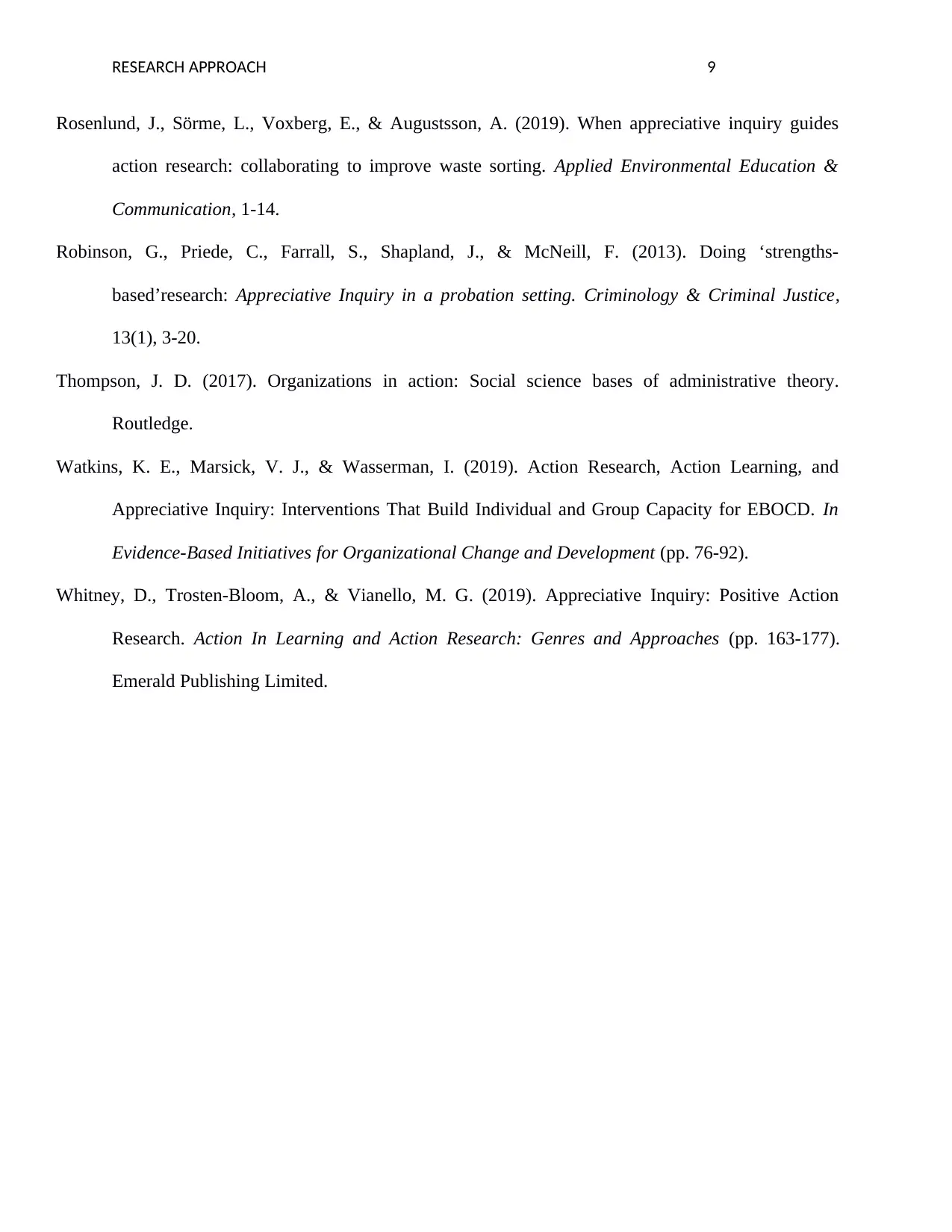
RESEARCH APPROACH 9
Rosenlund, J., Sörme, L., Voxberg, E., & Augustsson, A. (2019). When appreciative inquiry guides
action research: collaborating to improve waste sorting. Applied Environmental Education &
Communication, 1-14.
Robinson, G., Priede, C., Farrall, S., Shapland, J., & McNeill, F. (2013). Doing ‘strengths-
based’research: Appreciative Inquiry in a probation setting. Criminology & Criminal Justice,
13(1), 3-20.
Thompson, J. D. (2017). Organizations in action: Social science bases of administrative theory.
Routledge.
Watkins, K. E., Marsick, V. J., & Wasserman, I. (2019). Action Research, Action Learning, and
Appreciative Inquiry: Interventions That Build Individual and Group Capacity for EBOCD. In
Evidence-Based Initiatives for Organizational Change and Development (pp. 76-92).
Whitney, D., Trosten-Bloom, A., & Vianello, M. G. (2019). Appreciative Inquiry: Positive Action
Research. Action In Learning and Action Research: Genres and Approaches (pp. 163-177).
Emerald Publishing Limited.
Rosenlund, J., Sörme, L., Voxberg, E., & Augustsson, A. (2019). When appreciative inquiry guides
action research: collaborating to improve waste sorting. Applied Environmental Education &
Communication, 1-14.
Robinson, G., Priede, C., Farrall, S., Shapland, J., & McNeill, F. (2013). Doing ‘strengths-
based’research: Appreciative Inquiry in a probation setting. Criminology & Criminal Justice,
13(1), 3-20.
Thompson, J. D. (2017). Organizations in action: Social science bases of administrative theory.
Routledge.
Watkins, K. E., Marsick, V. J., & Wasserman, I. (2019). Action Research, Action Learning, and
Appreciative Inquiry: Interventions That Build Individual and Group Capacity for EBOCD. In
Evidence-Based Initiatives for Organizational Change and Development (pp. 76-92).
Whitney, D., Trosten-Bloom, A., & Vianello, M. G. (2019). Appreciative Inquiry: Positive Action
Research. Action In Learning and Action Research: Genres and Approaches (pp. 163-177).
Emerald Publishing Limited.
⊘ This is a preview!⊘
Do you want full access?
Subscribe today to unlock all pages.

Trusted by 1+ million students worldwide
1 out of 9
Related Documents
Your All-in-One AI-Powered Toolkit for Academic Success.
+13062052269
info@desklib.com
Available 24*7 on WhatsApp / Email
![[object Object]](/_next/static/media/star-bottom.7253800d.svg)
Unlock your academic potential
Copyright © 2020–2025 A2Z Services. All Rights Reserved. Developed and managed by ZUCOL.





